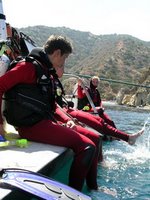Wednesday, April 12, 2006
Are You a Waterman?

While checking the news feeds this morning, I came across a press release from the Waterman Academy, a program that takes adolescent males and puts them through a three-week, intensive at-sea training program. The training includes life guarding, scuba and free diving, and a host of aquatic and maritime skills.
The website offers their definition of a “waterman” as “a person that has a complete understanding and respect for the ocean. One who has mastered a set of traditional aquatic skills and gained the knowledge to live, work, and prosper on or near the sea. One who protects the ocean and helps others understand and respect it as well.
This definition illuminates an interesting concept and one I contemplated in a final project for a long-forgotten journalism course in basic magazine writing offered at City College many years ago. I consider myself a waterman because of my skills in sailing, diving, and marine science, some of which are described on my personal website.
Deconstructing the definition provides stimulation for further reflection.
A person that has a complete understanding and respect for the ocean—I am not sure complete understanding is an achievable goal although certainly one worth striving toward. Can we ever really completely understand the ocean? Is it hubris to even assume we can? I seem to learn something every time I go on the water. My understanding and comprehension increases, but it never is satiated. Complete respect for me is not an end; it is a means, a prerequisite for the pursuit of the understanding. The sea is a harsh and unforgiving mistress and respect must always be maintained. Like the bumper sticker says “The Ocean Bats Last.”
One who has mastered a set of traditional aquatic skills and gained the knowledge to live, work, and prosper on or near the sea.—“mastered a set of traditional aquatic skills” implies that there is a body of knowledge and utilitarian practices that can be learned, practiced, and perfected. I could not find a specification of the skills on the website, so the list can be short or long. Certainly, seamanship would be one of the skills. But other than that essential skill, I envision a waterman as a bundle of skills, each necessary to define the quality with no single skill sufficient to define the quality.
And gained the knowledge to live, work and prosper on or near the sea.—This is a pretty straightforward quality, but one that, if taken literally, is a little constricting as it implied that people who live on the Great Lakes could never achieve the state of being a waterman.
One who protects the ocean—As with living near the sea, this reliance on “ocean” is too limiting. I do believe that people who protect all waterways have the quality of being watermen. I also believe that “protection” needs to be in viewed through the lens of the human environment. My definition does have a narrower utilitarian quality of conservation, as opposed to those in the “Deep Blue” movement whose approach is that of deep ecology, a natural system that has rights in and of itself without regard to human values.
And helps others understand and respect it as well. This is the capstone quality, the one that holds the others in place. Don Barthlemess, an instructor in the Marine Technology and Diving Program at Santa Barbara City College once described the concept of the “community of practice” whereby “masters” or “elders” in the community guided the apprentices or “newbies” in the acquisition and application of the basic skills.